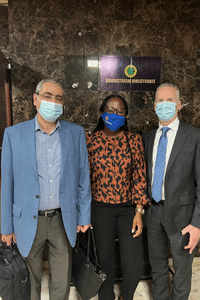As a follow-up visit from a 2019 mission, the U.S. Grains Council (USGC) returned to Nigeria and Ghana last week to continue sharing the benefits of ethanol use and encouraging the adoption of future fuel ethanol policies.
The Council revisited the two countries to conduct market assessments following the enactment of Nigeria’s Petroleum Industry Act in August 2021 and the Ghana Standards Authority’s (GSA’s) move to reflect an E10 standardization in the petroleum specification. By returning to Nigeria and Ghana, the Council hopes to improve the ethanol fuel policy authorities’ interest in ethanol fuels and the future adoption of ethanol policies.
“A fully implemented E10 policy in Nigeria provides a market to reduce local post-harvest losses supporting local producers and also providing additional environmental and economic benefits,” said Ramy H. Taieb, USGC Middle East, Africa and Europe regional director. “If Ghana is the first Economic Community of West African States (ECOWAS) member to source ethanol for gasoline blending purposes, the country will have a competitive advantage in local distribution and trading.”
The group began the mission in Accra, Ghana, before traveling to Abuja and Lagos in Nigeria. Travelers from the Council included Taieb; Joana Hassan, USGC manager of global ethanol programs; Jad Wakileh, USGC ethanol consultant for the Middle East, Africa and Europe; Mike Lorenz, Growth Energy senior vice president of market development; and Jose Jimenez, Zeeland Farm Services commercial and supply chain director.
In Accra, the team met with various government and industry groups, including the Ministry of Energy, National Petroleum Authority (NPA), Ghana Standards Authority (GSA), Ghana Oil State Company (GOIL), the Chamber of Bulk Oil Distributors (CBOD) and other relevant stakeholders to promote ethanol’s octane economics, ethanol environmental benefits in reduction of greenhouse gases (GHG) and CO2 emissions and support the adoption of an E10 policy in Ghana.

While in Abuja and Lagos during the final three days of the mission, the team met with the Ministry of Petroleum Resources (MPR), Nigerian Midstream and Downstream Petroleum Regulatory Authority (NMDPRA), Nigerian National Petroleum Corporation (NNPC), Standard Organization of Nigeria (SON) and the Major Oil Marketers Association of Nigeria (MOMAN), among other organizations.
“While COVID-19 kept us out of both markets for over two years, it was good to finally have an opportunity to engage with stakeholders on the ground to emphasize our commitment to providing technical support as both countries work on developing and enforcing favorable ethanol policies,” Hassan said.
Following the success of this mission, the Council plans to organize targeted workshops to address technical needs and foster policy building.
About The U.S. Grains Council
The U.S. Grains Council develops export markets for U.S. barley, corn, sorghum and related products including distiller’s dried grains with solubles (DDGS) and ethanol. With full-time presence in 28 locations, the Council operates programs in more than 50 countries and the European Union. The Council believes exports are vital to global economic development and to U.S. agriculture’s profitability. Detailed information about the Council and its programs is online at www.grains.org.

